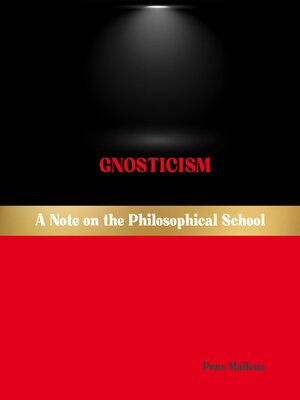Gnosticism
audiobook (Unabridged) ∣ A Note on the Philosophical School · Western Philosophical Schools
By Pons Malleus

Sign up to save your library
With an OverDrive account, you can save your favorite libraries for at-a-glance information about availability. Find out more about OverDrive accounts.
Find this title in Libby, the library reading app by OverDrive.



Search for a digital library with this title
Title found at these libraries:
| Library Name | Distance |
|---|---|
| Loading... |
This audiobook is narrated by a digital voice.
In an age flooded with information and noise, where the material and measurable often overshadow the inner and ineffable, a rediscovery of Gnosticism offers a strikingly modern relevance. This audiobook is an invitation to journey into a philosophical worldview that defied the orthodoxies of its time—and perhaps still defies those of our own. Gnosticism, often misunderstood or dismissed as a heretical fragment of early Christian history, is far more than a set of outlawed scriptures or esoteric rituals. It is a mode of thought, a way of being, and a profound challenge to the prevailing paradigms of existence, knowledge, and salvation.
At its heart, Gnosticism confronts a perennial human condition: the deep sense that the world, as we experience it, is somehow not as it should be—that we are exiles in a cosmos that conceals more than it reveals. Gnostics dared to name this unease, to mythologize it, and to systematize it into a metaphysical framework that combined ancient mythology, Platonic philosophy, and radical introspection. For the Gnostics, the material world was not merely flawed but fundamentally alien—a creation of lesser powers, a prison of the soul. Salvation, they claimed, comes not from belief or obedience, but through gnōsis: direct, transformative knowledge of the divine spark within.
This audiobook does not aim to romanticize Gnosticism, nor to reduce it to a single, unified doctrine. It is neither a defense of Gnosticism nor an attack on its critics. Rather, it is an attempt to understand it as a living, breathing philosophical tradition—complex, diverse, and internally contested. The reader will encounter the major themes of Gnostic thought: the demiurge and the pleroma, the fall of Sophia, the cosmic drama of entrapment and awakening, and the radical anthropology that sees the human being not as a sinner to be redeemed but as a divine fragment to be remembered.







